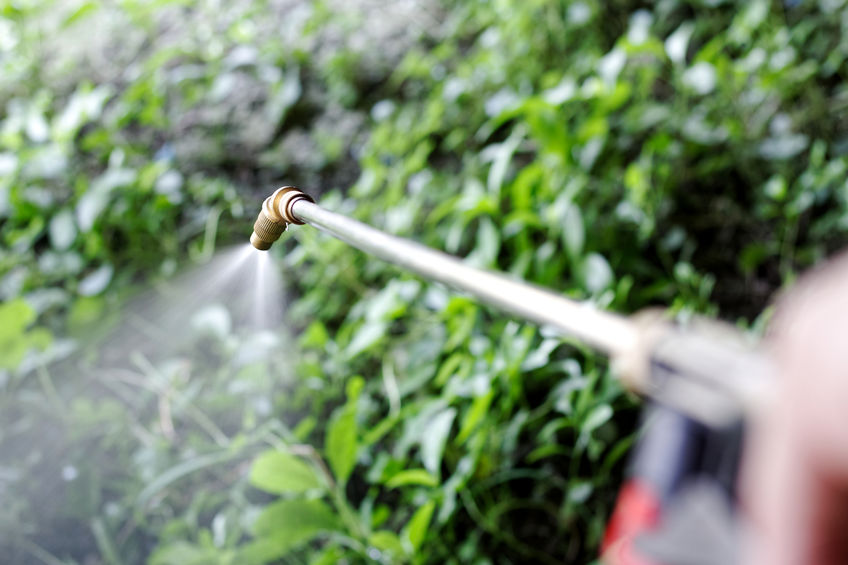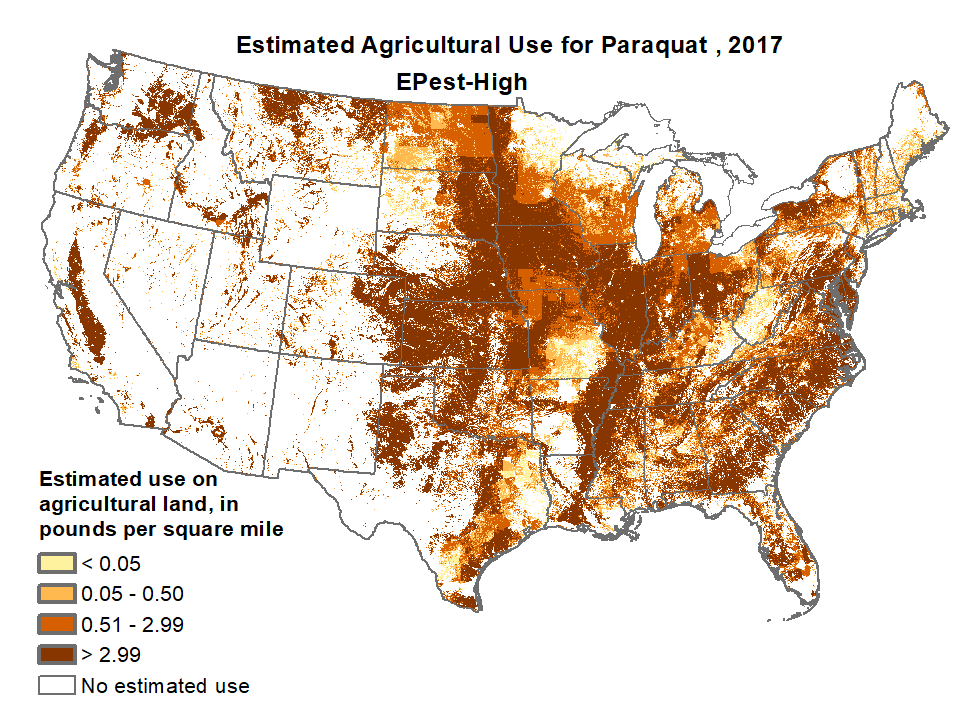In addition to developing Parkinson’s, chronic exposure through inhalation can also lead to lung damage, kidney failure, heart failure and esophageal strictures. Further, long-term exposure to Gramoxone may lead to lung and eye damage.
Tell Your State Reps to Vote No on SB30 & HB4806! |
Home - Paraquat
A paraquat settlement can help you cover the costs of medical treatment related to your condition and lost wages.
Because of a scientific link to Parkinson’s disease, you may be able to pursue a paraquat lawsuit against Syngenta. If you worked or lived near an area exposed to this extremely toxic herbicide and have since developed Parkinson’s disease, contact our Paraquat Lawyers as soon as possible. The window to pursue a claim may be limited.

We are representing anyone has been exposed to paraquat. Railroad workers are particularly encouraged to reach out to find out they qualify for the Paraquat Lawsuit.
If you were diagnosed with Parkinson's Disease or experience Parkinson's symptoms and are pursuing a diagnosis, we want to talk to you.
Generally speaking, the clock starts ticking the moment you receive a diagnosis. Our team can determine your specific SOL through a free consultation.
Paraquat dichloride is highly toxic and commercially used to prevent weed and grass growth near farms and crops. Farmers, laborers and agricultural workers are most at risk for exposure. Because of its toxicity and link to adverse health effects, anyone who handles the herbicide is required to have a license. Because of the ongoing litigation concerning Roundup, Paraquat’s use as an herbicide on U.S. farms is expected to grow. As a result, future farmers will remain at a higher risk of developing Parkinson’s disease.
According to the Unified Parkinson’s Advocacy Council, the younger a person is when exposed to paraquat increases the risk of developing Parkinson’s disease, anywhere from 200 to 600%.
Paraquat is a toxic chemical that is widely used as an herbicide, primarily for weed and grass control on farms. In the United States, paraquat is available primarily as a liquid in various strengths.
Paraquat made its first appearance as an herbicide in the 1960s. Even in those early days, it was clear that the substance was an extremely deadly and toxic chemical, raising alarms for many communities across the world. When ingested, the herbicide is extremely toxic to mammals—including humans. It has the potential to cause acute respiratory distress syndrome (ARDS). In addition, according to the Centers for Disease Control and Prevention (CDC), ingesting paraquat leads to failure in the liver, lung, heart and kidney up to 30 days after exposure. Further, in relation to Parkinson’s disease, recent scientific studies indicate:
In addition to developing Parkinson’s, chronic exposure through inhalation can also lead to lung damage, kidney failure, heart failure and esophageal strictures. Further, long-term exposure to Gramoxone may lead to lung and eye damage.
There are significant credible scientific studies on paraquat’s link to several adverse effects. Most notably, researchers attribute exposure to the herbicide with an increased risk of developing Parkinson’s Disease. A growing number of Paraquat Lawsuits against the manufacturers of the herbicide have already been filed. If you developed Parkinson’s disease after exposure, contact a qualified lawyer to discuss your legal options.
People that may have been exposed to paraquat include the following:
Call 800-359-5690 or complete a contact form to schedule your free, confidential consultation with a qualified Paraquat Lawyer.
While paraquat has long been banned in Britain and other European countries, the weed killer is growing in use in the United States. As more agricultural workers come across Roundup-resistant weeds, paraquat has been marketed in the United States as a weed killer alternative. In fact, paraquat use has risen by about 200% since 2009. While the herbicide is effective in killing undesired plant growth, it is also at the center of a growing number of lawsuits. Scientific research consistently shows that paraquat is connected to a host of health complications, including Parkinson’s disease. Agricultural workers, farmers, and families who have been adversely affected by paraquat may be able to pursue a Paraquat Lawsuit.
For the last couple of years, a new herbicide has been heavily used to control weeds in many agricultural and non-agricultural settings. Considered the “safer” alternative herbicide to Monsanto’s Roundup, paraquat’s label seems to be misguided to how safe the product is, including having to pass a paraquat certification for use.
Our lawyers are handling Paraquat Lawsuits in all 50 states. There is still time to hire a Paraquat Lawyer to represent you against the herbicide’s manufacturers.
Begin by consulting with an attorney to discuss your paraquat exposure and related health issues, gathering medical records and evidence. The attorney will then file a formal complaint in court and serve the defendants with legal notice, officially starting the lawsuit.
During the discovery phase, both parties exchange evidence and conduct depositions. Settlement negotiations and pre-trial conferences with the judge aim to resolve the case without a trial, addressing any procedural issues that arise.
If the case goes to trial, both sides present their evidence and arguments to a judge or jury. As a mass torts claim, it’s highly unlikely you will need to appear in court. After the verdict, the next steps include collecting compensation if successful or filing appeals and negotiating post-trial settlements if necessary.
Call us today at 800-359-5690 or complete a contact form to schedule your free, confidential consultation.
Hiring a lawyer for a Paraquat Lawsuit is highly recommended due to the complexity of toxic tort cases. Lawyers specializing in this field possess the expertise to navigate legal procedures, gather and present crucial evidence and engage with expert witnesses to build a strong case. They also handle the discovery process, negotiate settlements and represent you effectively in court if necessary. A skilled lawyer will ensure your rights are protected and increase the likelihood of a favorable outcome, helping you secure the compensation you deserve.


If you or a loved one was diagnosed with Parkinson’s disease after paraquat exposure, schedule a free consultation at 800-359-5690.

While paraquat is banned in Europe, the herbicide is one of its biggest exports to the rest of the world. In 2018, the United States was the world’s largest importer of the chemical herbicide. As noted, Roundup lawsuits have led to an increase in the use of paraquat across the United States. In the United States, there is heavy use in farming communities—meaning millions of people may have been affected by the toxic herbicide.
The degree of poisoning linked to Gramoxone depends on the amount, duration of exposure, route and the person’s health at the time of exposure. Exposure to this highly toxic chemical herbicide usually comes from swallowing chemicals. However, according to the Centers for Disease Control and Prevention, people can be exposed to paraquat in a variety of ways, including:
If you or someone you know developed Parkinson’s disease after a career in farming or living near a farm, contact a Paraquat Lawyer.
Paraquat kills cells through a mechanism called oxidative stress. This process alters cell chemistry and leads to extensive cell damage and death. As noted above, Parkinson’s disease results from the loss of function in the dopamine neuron cells.
No, Roundup does not contain paraquat. The active ingredient in Roundup is glyphosate. While exposure to Roundup’s glyphosate leads to non-Hodgkin’s lymphoma, experts link paraquat to Parkinson’s disease.
There is no treatment for paraquat poisoning.
Hold the corporation accountable for negligence or failure to provide adequate warnings.
Potentially receive compensation for medical bills, lost wages, pain, suffering and other damages.
There is no risk to you for joining the Paraquat Lawsuit. We work on contingency, meaning you don't pay unless we win.
The Carlson Law Firm is currently accepting clients who were diagnosed with Parkinson’s disease after using paraquat. We are accepting cases from all 50 states. If you or someone you love suffered injury by exposure to this toxic chemical, it is in your best interest to contact a Paraquat Lawyer. The initial consultation with our mass torts team is free and confidential. Also, you won’t pay unless we win your case.
The Carlson Law Firm has a team of attorneys experienced in cases like these. A Paraquat Lawyer from our firm will tirelessly fight for justice. The use of this highly toxic chemical has negatively affected thousands of farmers, gardeners, and others in agricultural industries. If a doctor diagnosed you or a loved one with Parkison’s disease after using this product, you might have a case. We protect victims nationwide from negligent companies for their injuries. Contact our office for a free consultation.
Take a step toward protecting your family’s future and contact us today to determine if you are eligible for a Paraquat Lawsuit. In summary, when you need a compassionate attorney, The Carlson Law Firm is ready to take your call.

With over a dozen locations throughout Texas, there’s a Carlson Law Firm near you. We have law offices located in Killeen, Temple, Waco, Round Rock, Austin, San Antonio, Kerrville, Laredo, Bryan, Lubbock, Midland, and Corpus Christi.
100 E. Central Texas Expy
Killeen, TX 76541
(254) 526-5688
11606 N. I-35
Austin, TX 78753
(512) 346-5688
135 W. Slaughter Ln, Ste A
Austin, TX 78748
(512) 804-7277
6243 I-10 #550
San Antonio, TX 78201
(210) 696-8600
618 SW Military Dr.
San Antonio, TX 78221
(210) 923-7700
1109 W. Baker Road, Ste A
Baytown, TX 77521
(832) 806-6155
1121 Briarcrest Drive, Ste 200
Bryan, TX 77802
(979) 260-5688
653 Everhart Rd, Ste 105
Corpus Christi, TX 78411
(361) 336-3317
301 Junction Highway, Ste 100
Kerrville, TX 78028
(830) 257-7575
5112 McPherson, Ste 106
Laredo, TX 78041
(956) 712-2588
10101 Quaker Ave
Lubbock, TX 79424
(806) 401-0500
900 Lp 250 Frontage Rd b
Midland, TX 79705
(432) 247-6611
1717 N. I-35 Ste 305
Round Rock, TX 78664
(512) 671-7277
4282 S Jackson St.
San angelo, TX 76903
(325) 238-4322
2010 SW H K Dodgen Loop, Ste 201
Temple TX 76504
(254) 771-5688
2420 I-35 South
Waco, TX 76706
(254) 772-5653
2909 Garnett Ave
Wichita Falls, TX 76308
(940) 285-6333
1500 Rosecrans Ave Ste 500
Manhattan Beach, CA 90266
(254) 516-3570
33rd Ave N Ste 220
St. Petersburg, FL 33701
(727) 373-4655
100 E. Central Texas Expy
Killeen, TX 76541
(254) 526-5688
11606 N. I-35
Austin, TX 78753
(512) 346-5688
135 W. Slaughter Ln, Ste A
Austin, TX 78748
(512) 804-7277
6243 I-10 #550
San Antonio, TX 78201
(210) 696-8600
618 SW Military Dr.
San Antonio, TX 78221
(210) 923-7700
1109 W. Baker Road, Ste A
Baytown, TX 77521
(832) 806-6155
1421 S Main St. Ste 113
Boerne, TX 78006
(830) 470-8777
1121 Briarcrest Drive, Ste 200
Bryan, TX 77802
(979) 260-5688
653 Everhart Rd, Ste 105
Corpus Christi, TX 78411
(361) 336-3317
5112 McPherson, Ste 106
Laredo, TX 78041
(956) 712-2588
10101 Quaker Ave
Lubbock, TX 79424
(806) 401-0500
900 Lp 250 Frontage Rd b
Midland, TX 79705
(432) 247-6611
559 S I-35 Frontage Rd Ste 250,
Round Rock, TX 78664
(512) 671-7277
4282 S Jackson St.
San angelo, TX 76903
(325) 238-4322
2010 SW H K Dodgen Loop, Ste 201
Temple TX 76504
(254) 771-5688
2420 I-35 South
Waco, TX 76706
(254) 772-5653
2909 Garnett Ave
Wichita Falls, TX 76308
(940) 285-6333
1500 Rosecrans Ave Ste 500
Manhattan Beach, CA 90266
(254) 516-3570
4700 Millenia Blvd. STE 500
Orlando, FL 32839
(727) 373-4655